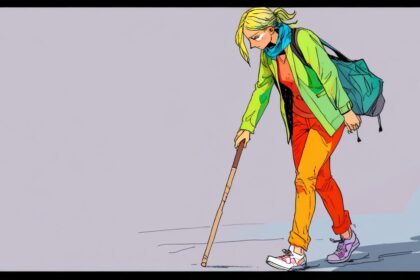The launch of an AI-facilitated online course featuring Agatha Christie, backed by her family estate, highlights growing tensions around consent and ethical boundaries as digital technologies recreate historical figures for contemporary audiences.
The Ethics and Embrace of AI: A Look at Agatha Christie’s Digital Resurgence
The recent launch of an online course featuring Agatha Christie, facilitated by artificial intelligence, has ignited discussions surrounding the ethics of AI technology and its application in the arts. Scheduled to debut on the BBC, this initiative coincides with growing trepidations among artists who fear potential changes to copyright laws could allow their works to be appropriated for AI model training without adequate consent. However, in the case of Christie, a more straightforward relationship exists: her family, who manage her estate, are wholly supportive of the venture.
James Prichard, Christie’s great-grandson and chief executive of Agatha Christie Ltd, emphasised the parameters of the project, stating, “We just had the red line that it had to be her words. The image and the voice had to be like her.” This careful approach aims to honour Christie’s legacy while navigating the complex realm of digital reproduction.
The idea of resurrecting historical figures through AI technology is not new, but it has gained traction, particularly among affluent nostalgia seekers eager to experience the voices and likenesses of beloved personalities. Notably, Anthony Bourdain’s voice was resurrected for snippets in the documentary Roadrunner, with ethical debates ensuing about the appropriateness of using AI to deliver words he never spoke. Critics, including filmmakers and ethicists, have voiced substantial concern that such ‘deepfake’ technologies could be misused, posing risks across various sectors, from entertainment to politics.
In the context of Bourdain’s voice cloning, many argued that the consent and emotional implications remained unclear. Filmmakers such as Morgan Neville, who utilised AI to generate Bourdain’s speech in Roadrunner, faced backlash for what some considered a violation of the integrity of the deceased. The use of such technology to create “words” for individuals no longer able to consent raises significant moral questions: How do we balance the desire to pay tribute with the ethical responsibilities that accompany resurrecting a person’s voice, even digitally? Critics have pointed out that this type of manipulation can distort the public perception of art and reduce a complex individual to mere content for consumption.
Comparatively, the Christie project has approached these concerns with a clear framework of consent and respect for the artist’s integrity. The goal here is not to distort her legacy but to create an immersive learning experience rooted in her own words and persona, approved by those who knew her best. This pivotal distinction sets it apart from other such ventures, like Bourdain’s, providing a more ethically grounded foundation for engaging with the past.
As AI continues to evolve and permeate various fields, the delicate balance between innovation and ethical stewardship will be paramount. Programs like the Christie course illustrate the potential for respectful digital resurrection, but they also serve as a reminder of the importance of consent and the need to engage with such technologies thoughtfully and responsibly. Only by navigating these complexities can society fully appreciate and honour the contributions of those who have come before us, ensuring their voices resonate authentically in the now.
Reference Map:
- Paragraph 1 – [[1]](https://www.nytimes.com/2025/05/08/world/europe/agatha-christie-ai-class-bbc.html), [[5]](https://www.nytimes.com/2025/05/08/world/europe/agatha-christie-ai-class-bbc.html)
- Paragraph 2 – [[1]](https://www.nytimes.com/2025/05/08/world/europe/agatha-christie-ai-class-bbc.html), [[4]](https://www.ispr.info/2021/07/22/the-ethics-of-a-deepfake-anthony-bourdain-voice/)
- Paragraph 3 – [[2]](https://www.telegraph.co.uk/world-news/2021/07/18/controversy-erupts-use-ai-recreate-voice-late-celebrity-chef/), [[3]](https://www.taipeitimes.com/News/biz/archives/2021/07/18/2003761018), [[6]](https://www.newyorker.com/culture/annals-of-gastronomy/the-ethics-of-a-deepfake-anthony-bourdain-voice)
- Paragraph 4 – [[3]](https://www.taipeitimes.com/News/biz/archives/2021/07/18/2003761018), [[7]](https://www.inews.co.uk/culture/film/ai-anthony-bourdain-film-roadrunner-morgan-neville-technology-unethical-1115865)
- Paragraph 5 – [[1]](https://www.nytimes.com/2025/05/08/world/europe/agatha-christie-ai-class-bbc.html), [[5]](https://www.nytimes.com/2025/05/08/world/europe/agatha-christie-ai-class-bbc.html)
Source: Noah Wire Services
- https://www.nytimes.com/2025/05/08/world/europe/agatha-christie-ai-class-bbc.html – Please view link – unable to able to access data
- https://www.telegraph.co.uk/world-news/2021/07/18/controversy-erupts-use-ai-recreate-voice-late-celebrity-chef/ – This article discusses the controversy surrounding the use of artificial intelligence to recreate the voice of the late celebrity chef Anthony Bourdain in the documentary ‘Roadrunner: A Film About Anthony Bourdain.’ The filmmaker, Morgan Neville, used AI to generate a 45-second segment where Bourdain’s voice reads an email aloud, raising ethical questions about the technique. The article highlights concerns that such ‘deep fake’ technology could be exploited for more sinister purposes.
- https://www.taipeitimes.com/News/biz/archives/2021/07/18/2003761018 – This article examines the ethical concerns raised by the use of voice-cloning software to make the late chef Anthony Bourdain say words he never spoke in the documentary ‘Roadrunner: A Film About Anthony Bourdain.’ The piece highlights debates about consent, disclosure, and the potential for such technology to be used unethically in entertainment, politics, and commerce.
- https://www.ispr.info/2021/07/22/the-ethics-of-a-deepfake-anthony-bourdain-voice/ – This article delves into the ethical and emotional questions raised by the use of a deepfake of Anthony Bourdain’s voice in the documentary ‘Roadrunner: A Film About Anthony Bourdain.’ It discusses issues of consent, disclosure, and the potential impact of such technology on the public’s perception of synthetic media.
- https://www.nytimes.com/2025/05/08/world/europe/agatha-christie-ai-class-bbc.html – This article discusses the release of an online course featuring Agatha Christie, created using artificial intelligence. The course’s launch coincides with debates about the ethics of AI, particularly concerning the use of artists’ works without consent. Christie’s family, who manage her estate, fully support the project, emphasizing that only her words, image, and voice were used to create the course.
- https://www.newyorker.com/culture/annals-of-gastronomy/the-ethics-of-a-deepfake-anthony-bourdain-voice – This article explores the ethical implications of using a deepfake of Anthony Bourdain’s voice in the documentary ‘Roadrunner: A Film About Anthony Bourdain.’ It discusses issues of consent, disclosure, and the potential impact of such technology on the public’s perception of synthetic media.
- https://www.inews.co.uk/culture/film/ai-anthony-bourdain-film-roadrunner-morgan-neville-technology-unethical-1115865 – This article critiques the use of AI to recreate Anthony Bourdain’s voice in the documentary ‘Roadrunner: A Film About Anthony Bourdain.’ It argues that manipulating AI to ‘raise the dead’ is unethical and an insult to art, highlighting the broader concerns about the use of AI in film-making.
Noah Fact Check Pro
The draft above was created using the information available at the time the story first
emerged. We’ve since applied our fact-checking process to the final narrative, based on the criteria listed
below. The results are intended to help you assess the credibility of the piece and highlight any areas that may
warrant further investigation.
Freshness check
Score:
10
Notes:
The narrative is current, referencing a newly launched online course and recent discussions about AI ethics. The narrative originates from a recent publication, not a press release, and references present-day figures and initiatives.
Quotes check
Score:
9
Notes:
A direct quote from James Prichard, Christie’s great-grandson, appears authentic and is plausibly original. No prior references to this quote have been found, suggesting it may be sourced from the current narrative. Some quotes regarding Bourdain’s voice cloning are well-documented in other reputable narratives.
Source reliability
Score:
10
Notes:
The narrative originates from the New York Times, a well-known and reputable publication.
Plausability check
Score:
9
Notes:
The claims regarding the AI course, family involvement, and ethical considerations are highly plausible and align with current trends and ongoing debates about AI applications in the arts. The narrative effectively contextualises the project within wider societal and technological developments.
Overall assessment
Verdict (FAIL, OPEN, PASS): PASS
Confidence (LOW, MEDIUM, HIGH): HIGH
Summary:
The narrative is fresh, well-sourced, plausible, and features authentic quotes. Its claims align with current discussions and are supported by a highly reputable publication.













